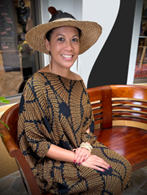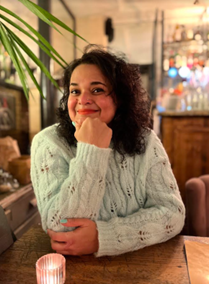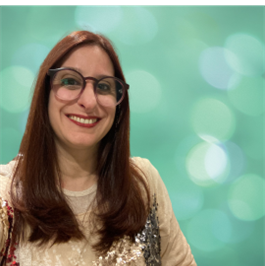2024 Keynote Speakers
Dr. María Cioè-Peña

Dr. María Cioè-Peña earned her PhD in Urban Education from The Graduate Center - City University of New York, where she was also an Advance Research Collaborative fellow and a Presidential MAGNET Fellow. She is a bilingual/biliterate education researcher and educator who examines the intersections of disability, race and language within school-parent partnerships and education policy. Taking a sociolinguistic approach and stance, she pushes and reimagines the boundaries of inclusive spaces for minoritized children. Stemming from her experiences as a former bilingual special education teacher, María’s research focuses on bilingual children with dis/abilities, their families and their ability to access multilingual and inclusive learning spaces within public schools. Her interests are deeply rooted in political economy, raciolinguistic perspectives and critical dis/ability awareness within schools, families and communities. María is currently an Assistant Professor of Educational Linguistics at the University of Pennsylvania’s Graduate School of Education.
Keynote Session: Dismantling The Master’s School: Interrogating racism, ableism and settler colonial logics in Language Education
Abstract: This talk will share how racial overrepresentation in Special and English learner programs is reflective of larger settler colonial frameworks embedded in linguistic standards that continue to drive education and language ideologies/practices globally but especially in North American/Western schools. I will highlight the colonial orientations of present practices –drawing connections across time– before offering recommendations to teachers and teacher educators.
Dr. Candace Kaleimamoowahinekapu Galla

Dr. Candace Kaleimamoowahinekapu Galla is Kanaka Hawaiʻi from Hawaiʻi Island. She holds the position of Associate Professor in the Department of Language and Literacy Education (Faculty of Education) and the First Nations and Endangered Languages program (Institute for Critical Indigenous Studies, Faculty of Arts) at the University of British Columbia (UBC) on the ancestral and unsurrendered lands of the hən̓q̓əmin̓əm̓ speaking xʷməθkʷəy̓əm (Musqueam) people in what is now known as Vancouver, Canada.
Dr. Galla earned her PhD in Language, Reading, and Culture, MA in Native American Linguistics, and BA in Linguistics, all from the University of Arizona. For nearly 20 years, her scholarship has focused on Hawaiian language and Indigenous languages, emphasizing education, and community-centered revitalization, digital technology, well-being, traditional and cultural practices, as well as policy and planning. She is dedicated to decolonizing and Indigenizing the academy to facilitate pathways for Indigenous thinkers and scholars. Her research and scholarship have been disseminated through publications, TedX, keynotes, invited presentations, master classes, guest lectures, workshops, school and community engagement, as well as media platforms -- locally, nationally, and internationally.
Keynote Session: Enriching our learning: (Re)Normalizing Indigenous languages in educational settings
Abstract: While educational systems, such as residential and boarding schools, have historically been used as a premeditative instrument in disrupting intergenerational language transmission of Indigenous Peoples, education today is a critical domain for Indigenous language renewal. With recent policies in what is now known as Canada, along with global initiatives demonstrating a level of commitment towards Indigenous languages, this keynote will explore practical approaches to (re)normalize Indigenous languages in educational settings. Creating meaningful and relevant opportunities to engage with Indigenous languages is a vital investment that enriches both individual and collective learning journeys.
Divya Madhavan

Divya Madhavan is the Director of the Department of Languages and Cultures at CentraleSupélec, an engineering school in France. She teaches English language courses and coaches their debaters for inter-varsity competitions. She is also the Founder and Director of Université Paris-Saclay’s Academic Writing Center, which provides communications training and publications support to one of France’s most prominent research communities. She is a graduate of the universities of Warwick, London, and Exeter, and a Fellow of the RSA. With extensive experience in building language policy, designing curricula, recruiting, and training teachers, she strongly believes in professional development that is truly meaningful and useful to busy teachers who so often have even busier lives.
Keynote Session: Language teachers as artisans of tolerance and understanding.
Abstract: Do you know the iconic evolution of man illustrations- depicting our journey from our cave selves to our current selves? I’ve often wondered where this journey is headed for language learning in our era of information glut, political hyperbole and societal change- where our relationship to learning, community, and identity are all shifting in profound ways with effects that we are not fully aware of, and in a relatively relentless landscape of stuff we need to know. From diet culture to financial culture to political culture, we are constantly inundated with “whys” and “how-tos”. As English teachers, we sift through, parse, and funnel what we make meaning from into classroom events that, in part, scaffold our students’ acquisition of culture and identity in the English-speaking world. In short, we engage our students in aesthetic language learning to help them carve their own relationship to the English language: how they speak and exist in the global currency and culture of English.
In this presentation, I will advocate for aesthetic learning experiences that deepen our relationship with our English-speaking identities. I will examine how we can tailor the classroom environment to provide not merely sufficient space, but the appropriate space for deeply exploring what it means to be an English language speaker, the importance of cultivating effective language learning habits, and how learners can make the most of this opportunity to boost their self-confidence.
Vicky Saumell

Vicky Saumell is a teacher, trainer, materials writer and presenter. She has worked for major publishers, especially in the areas of project-based learning and the meaningful use of technology for language learning. She has been the IATEFL LTSIG Coordinator. She currently teaches at primary and secondary level schools in Buenos Aires, Argentina, and continues to work as a freelancer for publishers and other organisations.
Keynote Session: Embracing technology for the right reasons
Abstract: It has been years since teachers have started using technology to enhance language learning. However, over the years, learning technologies have not always been used in the best interest of learners or teachers… And still, and even more so now after the pandemic and with the advent of Generative AI, a meaningful use of technological advances can make a world of difference. Teachers and learners have all been faced with a myriad of tech-infused options. How do we sift through them? What makes a tech-mediated experience successful? What have we learnt? As a passionate learning technologist, I want to invite you to dig out the gems lost in a world of rocks.